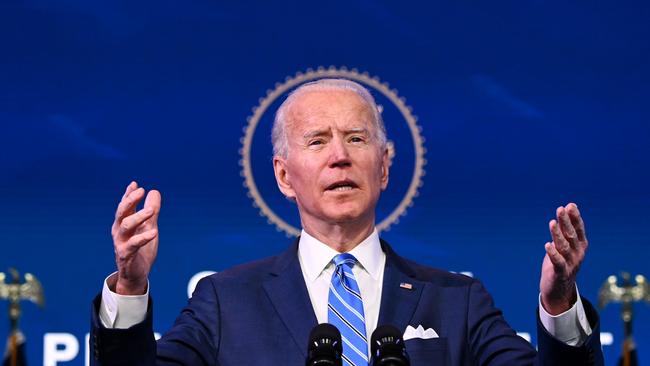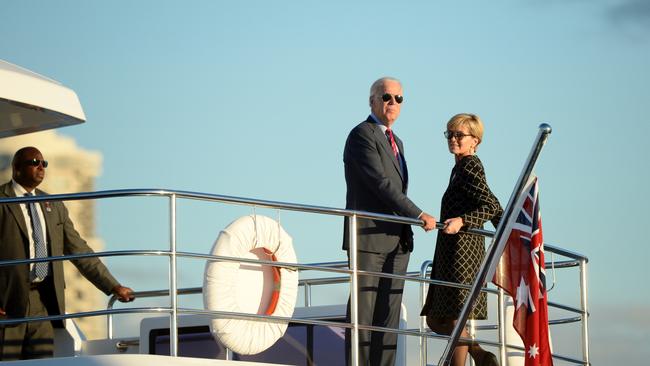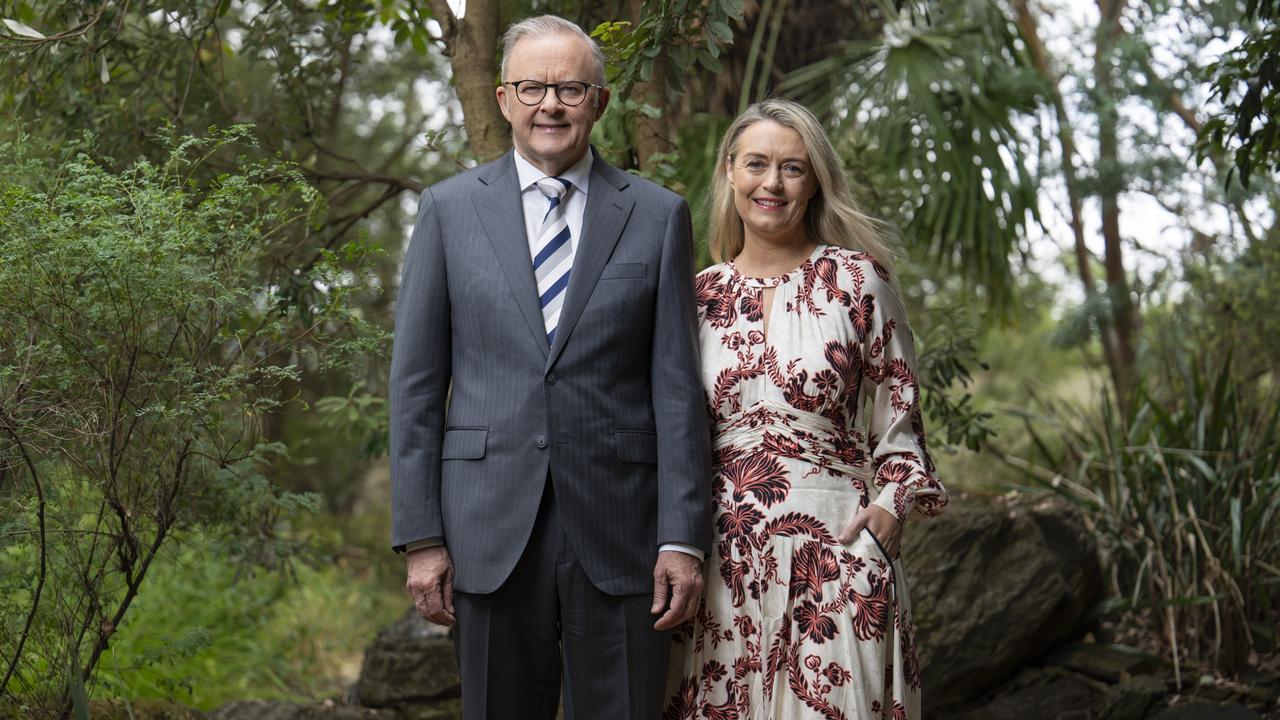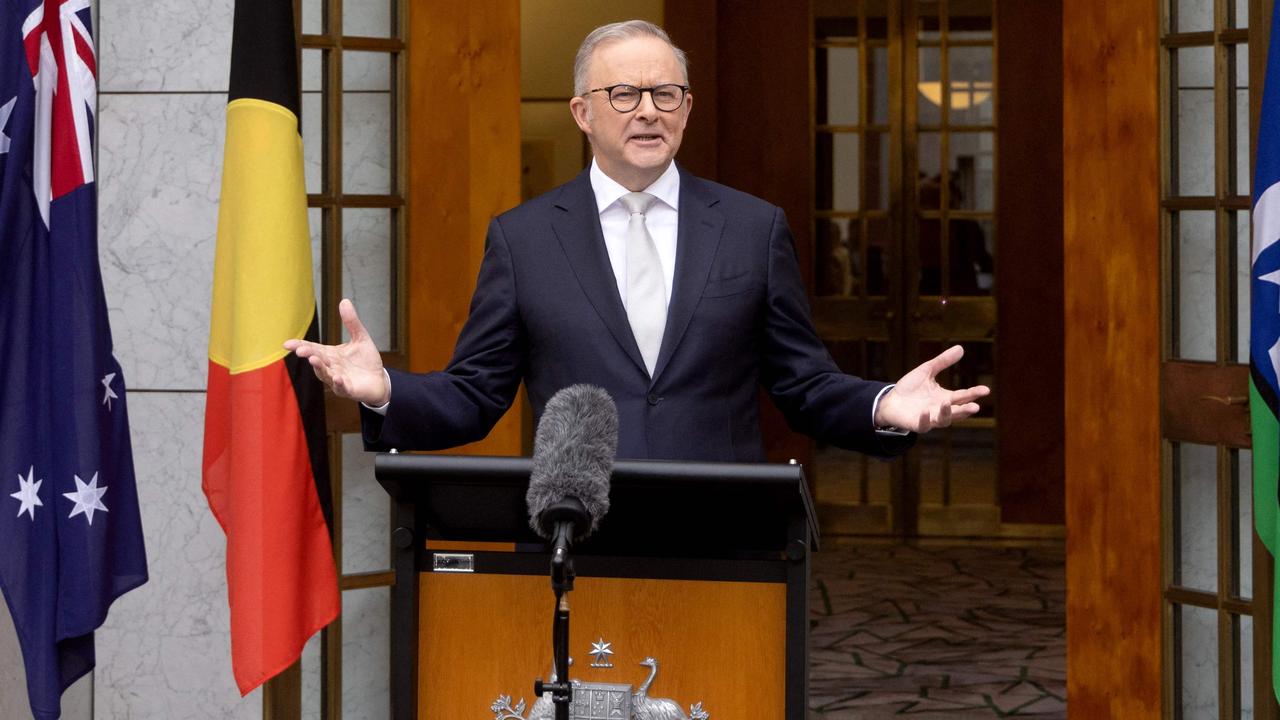New president Joe Biden will be a true-blue mate in the White House
The biggest immediate effect of Biden’s administration will be the massive experiment in Keynesian pump priming about to unfold — and faster economic growth for Australia.

“That may well be right,” says Bishop, who first met then vice-president Biden at his official residence in Washington DC in 2012, as shadow foreign minister.
“It happened to be my birthday and he arranged a cake and for the military band to play Happy Birthday,” she recalls fondly. “And almost exactly four years later, when he visited in Australia — in July — he arranged another little cake for me,” she adds, anticipating the same “thoughtful” tone to infuse his presidency.
Everyone I spoke to has nothing but high hopes for, and fond memories of, Biden, set to replace Donald Trump as US president next week.
“Without doubt it’s positive for us: a more orthodox and predictable administration, which is already appointing warm friends to the highest levels,” Bishop, now chancellor of the Australian National University, says.
Jeffrey Bleich, former US ambassador to Australia under president Barack Obama, says Biden “loved going to Australia”.
“And he’d always quiz me about it whenever I visited the White House. He’s predictable, reliable and trusts experts,” he tells Inquirer, in a none too subtle swipe at the incumbent.
“Bruce Reed, who will be Biden’s deputy chief of staff, will be one of the president’s closest advisers and he’s a long-time advocate of US-Australia relations in prior administrations,” Bleich adds, referring to just one of a slew of recent high-level appointments by Biden, including Kurt Campbell as “Asia Tsar”, that should prove favourable to Australia.
Yet for all the histrionics leading up to Trump’s narrow defeat in November, and the despair of his last few ignoble weeks in office, Biden’s impact on Australian policy will be tone and style more than substance.
“The US and Australia have this extraordinary deep and integrated relationship, there’s no single issue that is ever going to divide them,” says Bleich, who was in Canberra until 2013.
Australia and the US will remain entwined militarily, politically, economically, and no doubt socially, as the world continues to shrink.
“The end of the Trump presidency is not necessarily an inflection point in the Australia-US relationship the way it will be for France and Germany because Trump hasn’t presented the same level of irritation to us as to its traditional allies,” says one senior Liberal with foreign policy experience.
On balance, a Biden presidency will mean faster economic growth for Australia, in the near term at least, and the opportunity to wield more influence over US foreign policy.
Kim Beazley, former Australian ambassador in Washington, says the return of Obama-era officials signalled a fuller, more deliberative administration. “The Trump government was always a truncated entity. Trump was his own policymaker, not surrounded by people on a consistent basis of enormous ability,” he says. “Biden is coming in a sense with a traditional post-World War II American agenda, including dedication to liberal-democratic principles, positions which Australia has never abandoned. Biden is not a high-energy bloke on national security and military matters, he places enormous emphasis on coalition-building and international relationships. It’s a challenge for us because the US will be looking for ideas again; we’ll have to sharpen our intellectual tools,” says Beazley, a former Labor Party leader and now governor of Western Australia.
It’s a challenge that should suit the current Australian ambassador, Arthur Sinodinos, known for his keen interest in policy.

The biggest immediate effect of Biden’s administration will be the massive experiment in Keynesian pump priming about to unfold, which will, by helping buoy the world economy, take some pressure off other governments.
“The US economy is still the single most important influence on Australia’s,” says Stephen Kirchner, an economist at the US Studies Centre in Sydney. “US monetary policy (and) capital markets have huge effects that put the country ahead of China in its influence on us.”
On Friday, Biden revealed a $US1.9 trillion stimulus plan for the early days of his administration, including $US1400 payments to US households, which will bring the total payment to $2000 following the stimulus plan passed in December.
Michael Thawley, Australia’s Howard-era ambassador in Washington DC, expects a “huge focus on climate change; any infrastructure package will be heavily orientated to spending on subsidies for renewables and electric cars”. “They see it as job creator,” he says.
The first round of Biden-era stimulus, which will follow more than $US2 trillion of federal stimulus under Trump last March, will test the US government’s ability to borrow seemingly without limit.
In 2020 the US federal government alone posted a deficit of $US3.3 trillion, equal to the sum of taxes collected. The stock of debt is well above $US20 trillion and on track to exceed 100 per cent of US GDP.
If any country can run large deficits without implications for credit ratings or interest rates, it’s the US.
So far, all this borrowing — or, for the more cynical, creating money — appears to attract little penalty, interest rates on US debt are barely 1 per cent and inflation, as in Australia, remains dormant.
More left-wing Democrats will push for spending, and more radical economic policy. After all, avowed socialist Bernie Sanders, who just missed out on the Democrat nomination for president, is chairman of the powerful Senate budget committee.
Thawley, now vice-chairman of US fund management giant Capital Group, reckons any policy revolution is very unlikely, however, even in the wake of the Democrats’ surprise victory in the Georgia Senate race run offs on January 5.
“It’s true it’s 50-50 now in the Senate and Kamala Harris will have the casting vote, but moderate Democrats in formerly Trump-held states will be very careful about being seen to be radical, and rebel senators might decide to become independents, which has often happened,” he tells Inquirer from Washington.
“And more Democrats are up for re-election in the Senate in the 2022 mid-terms, which the party of the president typically loses,” adds Thawley, who was Tony Abbott’s secretary of Prime Minister and Cabinet in 2014.
Even the US tax system is on track to revert to Obama norms. Because Trump wasn’t able to secure a 60 vote “super majority” in the Senate to pass his signature 2017 tax reform package, the tax cuts will expire in 2024.
The US relationship with China, Australia’s biggest trading partner, is unlikely to change significantly from the tougher line taken by Trump, although the approach is likely to be more sophisticated. Trump’s obsession with the trade deficit, which didn’t change much despite ratcheting up tariffs on Chinese imports, will give way to a more sophisticated crackdown on technology theft and pressure on China to play by the rules of the multilateral trading system.
“Obama was constantly describing China as a competitor, whereas now it is more often described as potential enemy,” says Beazley. “Biden was point man when I was there when the US was dealing with Xi Jinping, they were both vice-presidents … the Americans perceived Xi as the coming man and they wanted to get quite close to him. The man to do that was Biden.”
Beazley, defence minister in the Hawke-Keating government, remained confident about Australian security in a region increasingly cowed by a more assertive China. “We are easy to defend; getting American commitment to defend Australia is easy, mainly because we can do most of it ourselves, but also because we don’t impose on the US any of the sorts of costs of defending, Japan, say,” he explains.
On trade, little is expected to change too. Trump scotched any US involvement in the Trans-Pacific Partnership, which Australia signed with 11 other countries in 2016, soon after he was elected. “Talk of the US joining TPP is all pie in the sky, the US is always hard-nosed on trade, it’s not going to change,” Thawley says. In any case, Biden’s authority to negotiate trade deals depends on congress extending the president’s right to negotiate — known as Trade Promotion Authority — beyond June.
The one area where a Biden administration might shift domestic policy, or at least the rhetoric surrounding it, is climate change. Trump withdrew the US from the Paris climate change agreement, a decision Biden will reverse.
Australia is the only developed country that hasn’t promised net-zero emissions by 2050. Bleich doesn’t see Australia being isolated by a Biden administration on climate change. “If there are differences about carbon reductions they will be worked out, as they always have been,” he says.
Bishop says she doesn’t expect “massive policy changes” here flowing from a Biden administration. Australia’s prospects should be at least as bright under a Biden presidency as under Trump, whose mercurial style at the very least made the outlook less predictable. At 78, Biden’s age has been a source of constant criticism about his fitness for office.
“People said the same thing about Ronald Reagan, and about Eisenhower in his second term; Woodrow Wilson had a serious stroke. A president doesn’t have to be a micromanager as long as they set broad directions,” says one senior Australian diplomat.
In other words, as long as he’s still capable of baking a cake.




Former foreign minister Julie Bishop has met Joe Biden probably more than any other Australian.